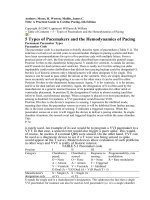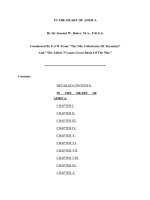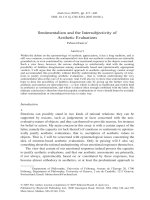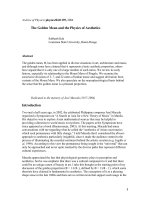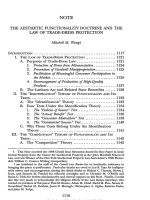Jackie Robinson and the Integration of Baseball pptx
Bạn đang xem bản rút gọn của tài liệu. Xem và tải ngay bản đầy đủ của tài liệu tại đây (459.46 KB, 178 trang )
Jackie Robinson
and the Integration of
Baseball
SCOTT SIMON
John Wiley & Sons, Inc.
fm.qxd 7/15/02 12:57 PM Page vi
Jackie Robinson
and the Integration
of Baseball
fm.qxd 7/15/02 12:57 PM Page i
Preeminent writers offering fresh, personal
perspectives on the defining events of our time
Published Titles
William Least Heat-Moon, Columbus in the Americas
Scott Simon, Jackie Robinson and the
Integration of Baseball
Forthcoming Titles
Douglas Brinkley on the March on Washington
William F. Buckley Jr. on the Fall of the Berlin Wall
Eleanor Clift on Passing the 19th Amendment
Alan Dershowitz on the Declaration of Independence
Thomas Fleming on the Louisiana Purchase
Sir Martin Gilbert on D-Day
fm.qxd 7/15/02 12:57 PM Page ii
Jackie Robinson
and the Integration of
Baseball
SCOTT SIMON
John Wiley & Sons, Inc.
fm.qxd 8/7/02 10:36 AM Page iii
Copyright © 2002 by Scott Simon. All rights reserved
Published by John Wiley & Sons, Inc., Hoboken, New Jersey
Published simultaneously in Canada
Design and production by Navta Associates, Inc.
No part of this publication may be reproduced, stored in a retrieval system,
or transmitted in any form or by any means, electronic, mechanical, photo-
copying, recording, scanning, or otherwise, except as permitted under
Section 107 or 108 of the 1976 United States Copyright Act, without either
the prior written permission of the Publisher, or authorization through pay-
ment of the appropriate per-copy fee to the Copyright Clearance Center,
222 Rosewood Drive, Danvers, MA 01923, (978) 750-8400, fax (978)
750-4470, or on the web at www.copyright.com. Requests to the Publisher
for permission should be addressed to the Permissions Department, John
Wiley & Sons, Inc., 111 River Street, Hoboken, NJ 07030, (201) 748-6011,
fax (201) 748-6008, email:
Limit of Liability/Disclaimer of Warranty: While the publisher and author have
used their best efforts in preparing this book, they make no representations or
warranties with respect to the accuracy or completeness of the contents of this
book and specifically disclaim any implied warranties of merchantability or fit-
ness for a particular purpose. No warranty may be created or extended by sales
representatives or written sales materials. The advice and strategies contained
herein may not be suitable for your situation. You should consult with a pro-
fessional where appropriate. Neither the publisher nor the author shall be liable
for any loss of profit or any other commercial damages, including but not lim-
ited to special, incidental, consequential, or other damages.
For general information about our other products and services, please contact
our Customer Care Department within the United States at (800) 762-2974,
outside the United States at (317) 572-3993 or fax (317) 572-4002.
Wiley also publishes its books in a variety of electronic formats. Some content
that appears in print may not be available in electronic books.
ISBN 0-471-26153-X
Printed in the United States of America
10 9 8 7 6 5 4 3 2 1
fm.qxd 7/15/02 12:57 PM Page iv
For New York
fm.qxd 7/15/02 12:57 PM Page v
fm.qxd 7/15/02 12:57 PM Page vi
1. Hero 1
2. Steaming Home 11
3. Brooklyn, 1947 33
4. Barred in Boston 43
5. Mr. Rickey’s Little List 53
6. “Oh, What a Pair, Those Two!” 67
7. Minor Leaguer 87
8. The Season 109
9. Epilogue 151
Acknowledgments, Notes, and Thanks 163
vii
Contents
1
Hero
A
s I began this book, many Americans were
beginning to be cautious about whom they
called a hero. Athletes, actors, entrepreneurs,
and celebrities had casually and carelessly been described
as such. To do so after September 11, 2001, seemed pre-
posterous. In the weeks following the attacks on New
York and Washington, D.C., and the foiled attack that
sent a plane crashing into western Pennsylvania, Ameri-
cans saw the grim and affecting faces of genuine heroes—
and they were caked in ash, blood, tears, toil, and sweat.
A man or woman might sink a basketball, strike a base-
ball, or scintillate before a camera lens. Those talents can
be worthy. But real heroes risk their lives for others.
My wife and I were crossing midtown Manhattan
about three weeks after the attacks and saw an assemblage
of broad shoulders in blue uniforms with red patches
standing outside the entrance to a church. The men and
1
JACKIE ROBINSON
2
women talked softly; anonymous black cars thrummed
their motors softly; pink and white flowers were piled
softly into the crooks of the concrete stairs. It was the
funeral for a New York firefighter. We went inside, impul-
sively, and then stayed, decisively. Gerard Barbara, who
was a fifty-three-year-old assistant chief of the Fire
Department of New York, had died risking his life for
strangers. It did not seem strange—in fact, it seemed
important—to take a seat amid some of the men and
women who had loved him. They wore blue uniforms,
thick-soled black shoes, and red eyes. Mayor Giuliani got
up to speak, a gravelly voiced man in a gray suit, who also
had red eyes. It was Mayor Giuliani’s fourth funeral serv-
ice of the day.
“Your father,” he said to Gerard Barbara’s son and
daughter, “used his great gift of courage to serve others.
The name he gave you,” he continued in the blunt tone
of a commandment, “is now a permanent part of the his-
tory of this city. And now, I would like everyone here to
stand and express their appreciation for your father.” We
stood, cried, and clapped our hands until our palms
burned like our eyes, then we applauded some more. A
line of blue shoulders with red patches filed softly out of
the church and back onto Fifth Avenue, where, for at
least a time, FDNY had replaced DKNY as a signature of
distinction.
The following weekend, we watched Cal Ripken Jr.
play his last game of major league baseball—his 3,001st.
Over a quarter of a century as a professional athlete, Cal
Ripken had become such an insignia of sturdiness and
class that the umpires stood in a line to shake his hand.
His opponents removed their fielding gloves to applaud
him. The signs blooming amid the green seats of Balti-
more’s Oriole Park at Camden Yards said
WE LOVE YOU
CAL
; THANKS, CAL; and CAL: WE
’LL NEVER FORGET YOU.
But the word hero seemed conspicuously, deliberately
absent. Events had revised our national vocabulary. At
least for the moment—it would be nice to think even for
longer—it would be hard for Americans to look out at a
mere playing field and see the kind of heroism we had
been reminded to revere in men and women in blue uni-
forms with red patches.
But even by this wiser standard, Jackie Robinson was a
hero. The baseball diamond is not simply a playing field
in his story. It was the ground on which he was most
open and vulnerable to taunts, threats, and sharpened
spikes.
The first African American major league ballplayer of
the twentieth century routinely took his rolling, pigeon-
toed stride out into the infield or batter’s box on days
and nights when local police had culled the stadium’s
mail to show him an assortment of explicit and persuasive
death threats. It is tempting today, when Jackie Robinson
is enshrined in halls of fame, social studies curricula,
HERO
3
JACKIE ROBINSON
4
classroom calendars, songs, and statues, to suppose those
threats were empty. But in the late 1940s, beatings,
bombings, lynchings, and shootings scarred the landscape
of the United States. They could be just as public as—
well, as baseball games.
Jackie Robinson gave his life for something great;
heroes do. He chose to bear the daily, bloody trial of
standing up to beanballs and cleats launched into his
shins, chest, and chin, and the race-baiting taunts raining
down from the stands, along with trash, tomatoes, rocks,
watermelon slices, and Sambo dolls. And then he per-
formed with eloquent achievement and superlative poise.
Robinson allowed that hatred to strike him as it would a
lightning rod, chanelling it down into the rugged earth
of himself. All that America saw for many years on the
baseball field was that iron as upright as a steeple, never
bending. But inside, the strain slowed his body, whitened
his hair, thickened his circulation, aggravated his diabetes,
and rendered him slow and blind. He was dead by the
age of fifty-three—a martyr (a word as deliberately
applied as hero) to trying to make America live up to its
creed.
If Jackie Robinson had not been selected to play the
role he performed so well, no doubt other superb African
American athletes would have soon stepped onto the
stage. The skills of Larry Doby, Roy Campanella,
Sam Jethroe, Ray Dandridge, Willie Mays, Monte Irvin,
Ernie Banks, and an aging Satchel Paige were too great
c01.qxd 7/15/02 1:06 PM Page 4
not to tempt major league clubs who were searching for
new sources of talent. World War II had moved many
Americans to examine their nation’s own self-image as a
bulwark of freedom. Editorial writers and civic leaders
were already clamoring for America to integrate the
armed forces, which had just won the world’s liberty, the
schools, in which children learned about justice, and
sports, which purported to epitomize American values.
How could a young black man who might be called up
to risk his life backing up Pee Wee Reese in Guam, or
Yogi Berra in Normandy, not be allowed to earn a living
alongside them on the same playing field?
America’s modern civil rights revolution was already
stirring by the time Jackie Robinson arrived in major
league baseball. With Vernon Johns, Thurgood Marshall,
A. Philip Randolph, and many more, it had already pro-
duced heroes. But Robinson’s courage and accomplish-
ment put a familiar face on the kind of bravery that it
took for blacks to stand up for their rights. His heroism
was no greater than that of millions of others—some
achievements simply cannot fit into box scores. But
Robinson’s renown gave his heroism reach. It is possible
to see, in Robinson’s slow, purposeful walk into the face
of taunts and threats, some of the same unbowed
courage that Americans would later admire in the civil
rights marchers who faced down stinging water sprays,
sharp rocks, and snapping police dogs. When Robinson
joined Dr. Martin Luther King’s nonviolent campaign in
HERO
5
c01.qxd 7/15/02 1:06 PM Page 5
JACKIE ROBINSON
6
Birm
ingham in 1963, marchers called out, “Show us,
Jackie!”
Jackie Robinson is so highly esteemed for his
Gandhian restraint against the onslaughts of bigotry that
it is easy to mistake him for a social activist. He certainly
became a militant campaigner for civil rights, an outspo-
ken newspaper columnist, and a combative Republican
when that party was more identified among blacks with
Lincoln, La Guardia, Rockefeller, and Lindsay, while the
Democrats were dishonored by Strom Thurmond,
Orville Faubus, and George Wallace.
But first and last, Jackie Robinson was a hard-nosed,
hard-assed, brass-balled, fire-breathing athlete. The Jackie
Robinson that his old Pasadena and UCLA teammates
remembered could be a petulant star. He mocked lesser
competitors and came to expect that his regal status on
fields of play would excuse him from the need to attend
class or complete assignments; and so it did. When, on a
couple of occasions, Robinson’s high spirits and dark skin
brought him into the grasp of the Pasadena police, his
case was considered with compassion by a local judge,
who was loath to deliver a penalty that would cause the
accused to miss next Saturday’s game. Few other young
black men in Southern California could rally so effective
a defense as Robinson’s in rushing yards, passes caught,
and punts returned.
Jackie Robinson played less than a single season in the
Negro Leagues, for the fabled Kansas City Monarchs.
c01.qxd 7/15/02 1:06 PM Page 6
Among a group of gifted professionals who had to
endure all-night rides on bone-clattering buses and
blocked doors at whites-only diners and motels, Jackie
Robinson was remembered more for griping about
the league’s showboating and lack of training and disci-
pline. He let his teammates know that he considered the
league beneath his talents (and maybe it was—for all of
them).
The Jackie Robinson who stayed on to become a
perennial major league star after he became a hero could
be prickly. Another way to say it is: Jackie Robinson could
be a prick. Even after he had become one of the most
admired personalities in America, Robinson could spring
up and cry racism at umpires with the impudence to call
him out on a close slide or a strike. He could crash into
an opponent’s knees on inconsequential plays, just to let
them know he could hurt them. He harangued opposing
players, and sometimes his own teammates, with graphic
epithets of the kind that would have once been consid-
ered legal provocation for a duel (although the epithets
were never racial and rarely sexual—Jackie Robinson was
no racist, and he was even a bit of a prude).
But Jackie Robinson was no less a hero for being a
full-blooded human being. When he was summoned by
history, he risked his safety and sanity to give history the
last full measure of his strength, nerve, and perseverance.
In the end, real heroes give us stories we use to reinforce
our own lives.
HERO
7
c01.qxd 7/15/02 1:06 PM Page 7
JACKIE ROBINSON
8
•••
Shortly before nine o’clock on the morning of September
11, 2001, Jackie Robinson’s widow, Rachel Robinson,
and Dorothy and Mark Reese, Pee Wee Reese’s widow
and son, were in New York’s City Hall, along with old
Dodgers Ralph Branca and Joe Black. They were there to
choose among five sculptor’s models arrayed on a con-
ference table, each depicting that fabled moment from
the 1947 season in which Pee Wee Reese had crossed the
field from his post at shortstop during a downpour of
racial taunts to slip his arm encouragingly around Jackie
Robinson’s shoulders.
Before the group could choose a model to be cast in
bronze and put up in Brooklyn, they heard a boom, then
a commotion. New York police officers rushed them onto
a bus. The bus got blocked and could not move through
the tangle in the streets. New police officers sprinted
aboard and took the Dodger family members into the
bomb shelter of a nearby bank building, which is where
they were, huddled and held rapt before a television set,
when the first World Trade tower fell from the skyline.
Dorothy Reese turned to her son, who is a California
filmmaker. “I’m just glad,” she said in the first gloom of
the attack, “that Jackie and your father aren’t here to see
this.” Mark Reese gently, consolingly, disagreed. “I think
Pee Wee and Jackie are here,” he told his mother. “And
c01.qxd 7/15/02 1:06 PM Page 8
we need their courage now.” I can’t think of a time when
we don’t.
The story of Jackie Robinson’s arrival in the major
leagues is a heroic American legend. It is not in the same
rank as Valley Forge, Gettysburg, Lincoln’s trials, Harriet
Tubman’s bravery, Chief Joseph’s valor, or the gallantry
of the police and firefighters who ran willingly into the
firestorm of the World Trade Center. But Jackie Robin-
son’s story still testifies to the power of pure personal
courage to turn history and transform adversaries into
admirers. It is a story that endures all the nicks and nits of
revisionism because, when the last page is turned, it plays
on in our minds and lives: a bold man, dark-skinned and
adorned in Dodger blue, who displays the daring and
audacity to stand unflinchingly against taunts, strike back
at beanballs, and steal home with fifty thousand people
watching and waiting for Jackie Robinson to spring will-
ingly into the path of a pitched ball and slide into the
ironbound clench of a catcher protecting home plate. It is
a story that still rouses us to shake off dust, blood, and
bruises and keep going.
HERO
9
c01.qxd 7/15/02 1:06 PM Page 9
c01.qxd 7/15/02 1:06 PM Page 10
2
Steaming Home
A
t the close of World War II, the United States
was both a citadel of freedom and a bastion of
segregation.
Americans had been slow to see any threat to their
own freedom in the rising menaces of Nazism and Japan-
ese imperialism. Many Americans had been more or less
willing to see the old monarchies of Europe squeezed
between two tyrants, and Asia overrun by strutting mili-
tarists. But the attack on Pearl Harbor shook Americans
out of their sleepy self-absorption. They then gave their
muscle and treasure to throwing back oppression across
t
he world. They sent their own sons (and more than a few
daughters) from Nebraska and Oregon to Normandy and
Iwo Jima. They shed their own blood on forlorn Euro-
pean bluffs and a score of Pacific islands and atolls.
But the forces of soldiers and sailors that represented
America were profoundly segregated. Whites, blacks,
11
c02.qxd 7/15/02 1:10 PM Page 11
JACKIE ROBINSON
12
and Japanese Americans (who were recruited into their
separate brigades) wore the same uniform, and fought for
the same flag. But they served, slept, ate, and even
waged war in separate units. The black seamen who
loaded the bombs onto the boats that steamed into battle
often welcomed assignment away from home, to England
and Australia. At least there they could buy a beer in a
pub without signs that said “No Colored Allowed.”
During the years in which America prevented racist
tyrannies from engulfing Europe and Asia, twenty-one
black citizens were strung up from trees in Alabama,
Mississippi, Georgia, and Louisiana. Those were just the
lynchings that were reported: public events, with crowds,
cameras, and even picnics. Clergymen often attended, to
sanctify the proceedings. There were also scores of racial
murders that local police declined to consider crimes:
beatings, shootings, and firebombs tossed into bedroom
windows of black families in the middle of the night.
At the close of World War II, no major nation in
the world was freer or stronger than the United States.
But few major nations so openly and legally subjugated
so many of its own citizens. When the National Party
came to power in South Africa in 1948, it had a model
for designing the particulars of the racial division it
called apartheid: the American South, and the compre-
hensive array of signs that hung over schools, rest rooms,
restaurants, water fountains, soda fountain counters,
movie theaters, and even churches:
c02.qxd 7/15/02 1:10 PM Page 12
WHITES ONLY
NO COLORED
Such signs are almost impossible to imagine today.
Museums have been opened so that we don’t forget their
ugliness and cruelty, the way those signs disfigured a free
society. But a half-century ago, many Americans found it
impossible to imagine living in a place that wasn’t so
marked.
In July 1944, Army lieutenant Jack Robinson defied
those lines when he got aboard a bus on the Fort Hood
army base in Texas and took a seat in a middle row. The
unwritten rule of Texas transit then was that whites
could fill the rows in the front of the bus until they were
all seated. Blacks could only take seats beginning from
the back. But the unmarked line between front and back
moved back and forth like the first-down chain on a foot-
ball field, as white riders came on and got off. The lunatic
fine points of official segregation were clear to bigots: no
black man or woman could take a seat in front of a white,
or in the same row; on no account could blacks and
whites ever sit next to one another.
The U.S. Army had banned segregation on buses that
operated on army bases in 1944, after uniformed soldiers
Joe Louis and Sugar Ray Robinson had famously refused
to be relegated to a segregated area of an Alabama bus
STEAMING HOME
13
c02.qxd 7/15/02 1:10 PM Page 13
JACKIE ROBINSON
14
depot. The army was mortified. Louis and Robinson were
on morale-building tours of army bases. Their mission was
to shake hands in hospitals, barracks, and dining halls, and
box a few desultory exhibition rounds with local palookas
who would wear a small plum of a bruise as a medal from
the great Louis or Robinson. The champions’ visits were
supposed to remind the soldiers of Jesse Owens outrun-
ning Hitler’s brownshirts at the Munich Olympics* and
Joe Louis conquering Max Schmeling—of America’s
bashing equality, not its appalling racism.
Jackie Robinson had confronted little in the U.S.
Army that would convince an intelligent man that the
uniform he wore signified that his side was battling for
liberty. After filling the Rose Bowl on Sunday afternoons
playing football for UCLA, the U.S. Army put Jackie
Robinson in segregated barracks. At Fort Riley, Kansas,
he was denied the chance to qualify for officer training
that his academic and athletic background should have
conferred—and did, on white men. Robinson com-
plained to Joe Louis, who also happened to be stationed
there; he mentioned the affront to an adviser in the
White House, who contacted the Pentagon. Public affairs
officers interceded with Fort Riley’s commanders to
explain that keeping the most renowned college athlete in
the country out of the officer corps would bestow no
* Mack Robinson, Jackie’s older brother, finished second behind Jessie
Owens and won a silver medal for the United States.
c02.qxd 7/15/02 1:10 PM Page 14
acclaim on either the army or themselves. So Robinson
was commissioned a lieutenant. Grudgingly.
Lieutenant Robinson was then appointed a morale
officer for black soldiers at Fort Hood. The morale officer
was traditionally in charge of keeping his unit stocked
with ample amenities and diversions, from chewing gum
to condoms to Friday night movies. The army suggested
that the morale of Robinson’s unit would be enriched if
Lieutenant Robinson became a running back for Fort
Hood’s football team, which played local colleges as well
as other army bases. But Robinson did not want to spend
sweltering Texas afternoons bouncing lesser athletes off
his All-American knees. He refused.
His rebuff grew more resolute when Robinson pre-
sented himself at Fort Hood’s dusty baseball diamond
and asked to try out for the baseball team. He was turned
away—told to his face by a fellow officer, a white man,
that “you have to play for the colored team.” It was an
unfunny joke: there was no colored team. After a fabled
college career during which he was laden with honors,
cheers, entreaties from coeds of all colors, and emolu-
ments from alumni, this moment might have been the
first time that Jackie Robinson ran across organized seg-
regation on a sports field. The notion that some people
might care more about ethnicity than victory was
outlandish to Robinson. Pete Reiser, who would later be
Robinson’s teammate on the Brooklyn Dodgers, was also
stationed at Fort Hood and was present that day on the
STEAMING HOME
15
c02.qxd 7/15/02 1:10 PM Page 15

